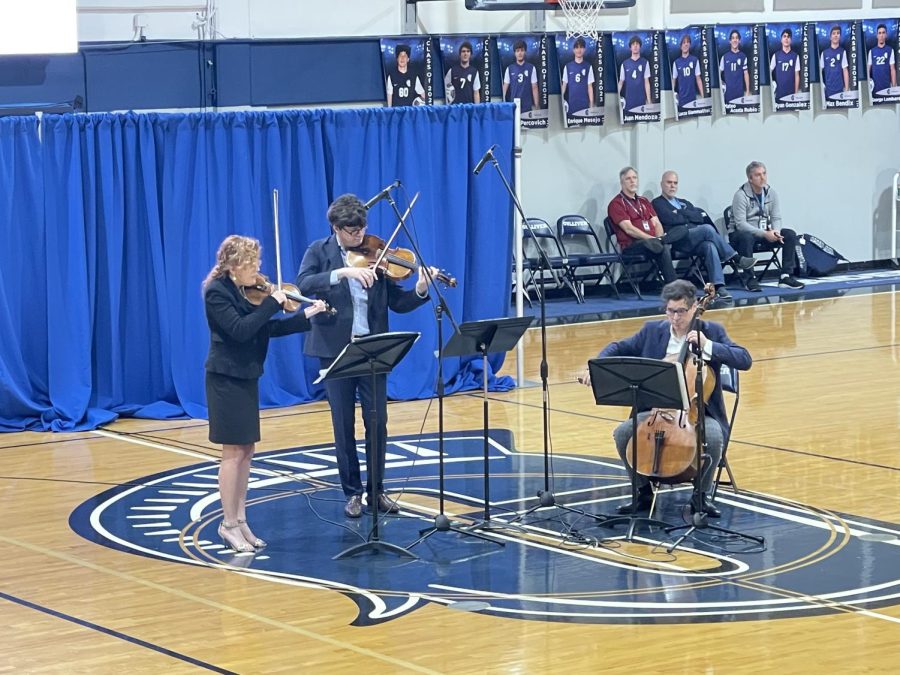Black Oak Ensemble Performs “Silenced Voices” in Commemoration of Auschwitz Liberation Anniversary
The Black Oak Ensemble, consisting of violinist Desirée Ruhstrat, Aurelien Pederzoli, and cellist David Cunliffe, perform their “Silenced Voices” album in front of upper school students and faculty. The trio were also scheduled to perform at the Marian C. Krutulis campus only an hour later.
January 27, 2023
This Friday, the school commemorated Jan. 27, 1945, the day of Auschwitz-Birkenau’s liberation by hosting a performance from the Chicago-based Black Oak Ensemble in the gym. The string trio played their debut album, “Silenced Voices,” a collection of works spotlighting Jewish-European composers from Czechoslovakia, Austria-Hungary, and the Netherlands who suffered under the Nazi regime. Of these six composers, only one would go on to survive World War II.
Violinist and member of the Black Oak Ensemble, Aurelien Pederzoli, explained how the inspiration for the album began while in a music store in Budapest. The two other members of the trio, violinist Desirée Ruhstrat and cellist David Cunliffe, discovered sheet music they had never previously seen while in the store. Upon playing it, they were taken aback by its greatness. One of the creators for the music they heard was Sándor Kuti, a composer who was murdered in the Holocaust. Pederzoli said that if he would have lived, he would “have been one of Hungary’s greatest composers.”
And so came the inspiration for “Silenced Voices,” an album that went to debut at number one on the classical music charts. According to Pederzoli, “context is everything. Now you listen to the music and you listen to it in a different way.”
The last piece performed by the trio was one written by Kuti two and a half weeks before being deported to Auschwitz. During his detainment, Kuti’s “Serenade for String Trio” was created with improvised paper and handmade ink, later being smuggled out by the help of a sympathetic guard who delivered the violin sonata to his wife. The composition was dedicated to his unborn child.
“I thought it was a really amazing performance with really well chosen music, but it’s a very hard thing for students to enjoy at 8 a.m.” said senior Heloise Sauvage. “Something that’s a mix of baroque, jazz, and classical mixed in with the period of the Holocaust is very complicated to understand; it should have been done later in the day.”
Both students and faculty walked away from the performance with their own interpretations of the music.
“I interpreted the pieces as starting with a slow tempo at the beginning and an erratic tempo as it went on: in parallel to the events of that time period. A lot of the pieces seemed to mirror the emotions of the people persecuted throughout Holocaust. It’s the feeling of going through a traumatic experience— a time of insanity where a person’s very existence may be ripped from them on any given day,” said economics teacher Dr. Cheryl Joseph.
According to Pederzoli, part of the album’s purpose was to not only preserve the works of forgotten sheet music and its composers, but to serve as a solemn reminder for listeners of the atrocities committed during the Holocaust and to ensure that they are never forgotten.













